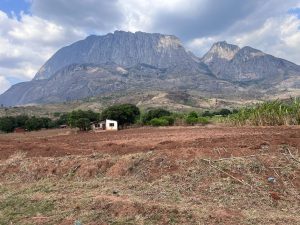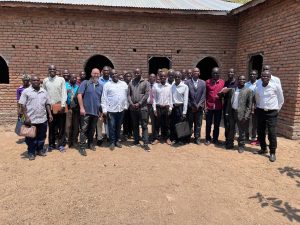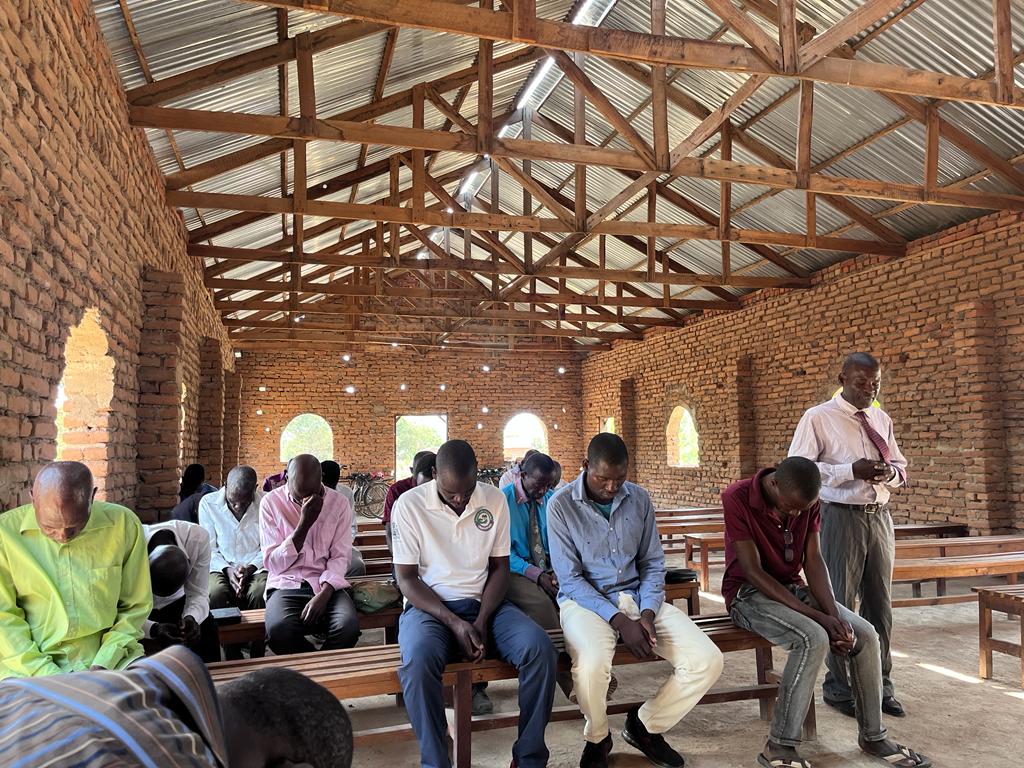I’m afraid I’ve been spoiled by my stay at the Hapuwani Lodge in Malawi. Our lodge has working air conditioning, hot water, a comfortable mattress, minimal mosquitoes, and an incredible view. What more can you ask for? Oh yeah, Coke Zero. Oh well, maybe I’ll be able to find some in Liberia (I’m really suffering for Jesus). Nevertheless, I awakened this morning refreshed from a good night’s sleep and ready to seize the day’s agenda, which included a meeting with our Malawi team to catch up and hammer out a plan to accelerate training across Southern Malawi.
After some decent coffee and a banana, we squeezed into our cramped car and began the hour-long journey to Chiringa, a small village about thirty miles from the Mozambique border. Driving through the rural countryside is quite a feast for the senses. Our journey begins by taking us past thousands of acres of green tea fields which cover the valley floor. Along the way, daily life in Malawi unfolds before your eyes. Women walk along the roadside carrying jugs of water and various wares upon their heads, uniformed children chat loudly and giggle as they walk to and from school, laborers haul everything from crops to blocks of concrete on bicycles, buses packed to the gills with passengers scream by with black smoke billowing from the exhaust, and the occasional goat and cow plays chicken with traffic. All the while, majestic Mount Mulanje rises like a spier in the background. The only unpleasant thing is that it is the dry season, which means that everything is covered in a cloud of dust and the noonday sun can be quite blistering. Another reason I am grateful for working air conditioning at the lodge.

Malawi is known as the warm heart of Africa because of both its geographic location and the genuine friendliness of its people. Nevertheless, how the people remain warm in the face of such harsh conditions as they are forced to endure daily is a testament to their resilience and faith.
Due its location, Malawi is subject to cyclones. Over the past three years Malawi has experienced three devastating cyclones, two of which are the largest and most destructive in recorded history for this part of the world. Bishop Duncan, who serves as our ITEM coordinator for Malawi, showed us the extensive damage the most recent cyclone left behind represented by hundreds of piles of bricks which litter the landscape, the remains of homes that collapsed under the cyclone’s fierce winds and rushing waters. Homes which had just been rebuilt from the previous cyclones.
Massive meandering scars are imprinted on the mountainside revealing the path of surging torrents of water that coursed down the mountain from the storm’s bounty sweeping away trees, animals, crops, homes, and people in its furious path, and depositing massive stones from the mountain’s heights to the unsuspecting villages below. Because the cyclone struck overnight, many were caught sleeping and were washed away to their deaths. Now these poor souls are left to try to rebuild their lives once again with only God to help them.
If the persistent natural disasters are not enough to discourage, then certainly the daily political and civil corruption must be. The President of Malawi is a former pastor. In fact, he served as the Superintendent of the Malawi Assemblies of God denomination. When he was elected, there was great hope among Malawians that this man of God would rid the country of its history of political corruption and serve as a president for the people. Unfortunately, history has a penchant for repeating itself. Corruption has not been abated. In fact, the righteous have become corrupted and hope for a better and more prosperous Malawi fades, as Malawi remains one of the poorest countries in Africa, while its leaders live in luxury.
One widespread example of corruption is the petrol (fuel) black-market. In rural petrol stations, you can find diesel, but you cannot find petrol. You cannot find petrol because the fuel trucks purposefully arrive at the stations at night where they are met by a band of scavengers carrying plastic jugs and tubs who pay the driver a fee for a portion of the fuel. Then these “entrepreneurs” sell petrol in the villages for an exorbitant rate, and all with the approval of the “Christian” government. Today the fuel is going for $18 per gallon. This requires many to drive an hour or more to a larger city for petrol, where they will wait for up to two to three hours in long lines hoping when their time comes some fuel is available.
While daily corruption abounds, one must also deal with the occasional mob violence perpetrated by aimless youth desperate to escape the clutches of poverty and looking for any opportunity to loot and pillage. Bishop Duncan shared with us his own harrowing story of surviving a frenzied mob attack upon his home. Details are sketchy but it seems as if a child riding a bicycle in his village was involved in a hit and run. Some rebel rousers in the village began to spread the rumor that the driver had fled to Bishop Duncan’s compound for refuge and the bishop was hiding him.
Soon a furious mob descended on the bishop’s compound while he and his family hunkered down in a closet in the bedroom fearing for their lives. The first police unit to arrive were overwhelmed by the growing angry crowd and gave up any resistance. The mob proceeded to shatter windows, strip vehicles, break down gates and doors with pickaxes and clubs, tear apart large sections of the roof, and steal everything that was not nailed down in the house. Mercifully, a second unit of policemen arrived from a neighboring district possessing the proper firepower to restore order. But the damage had been done.
Unfortunately, my dear friend lost everything. That terrifying event was almost six months ago. As of today, Bishop Duncan is still displaced as his home remains in a state of unlivable disrepair while he patiently waits for provision to rebuild.
I asked him if he or other Malawian Christians ever have a crisis of faith when they must live with such constant uncertainty and unbearable injustice. He shot me a quizzical look and I explained how many Christians in America experience a crisis of faith or downright deconstruction of faith when life gets hard. He told me that Malawian believers do not find their suffering to be strange. They do not know anything else. It certainly never causes them to experience a crisis of faith. Then he ended the discussion with these words, “God is faithful!”
God is faithful. How can it be that people who experience so much suffering and those who experience so little can come to such disparate perspectives about the nature of God? If faith in Christ can sustain Malawians in the face of such unrelenting suffering, then it can sustain you as well, dear friend.
When one visits this beautiful part of Southern Malawi, it is impossible not to be inspired by the towering peaks and breathtaking views of Mount Mulanje. But for the faithful, Mulanje is beautiful for a different reason. It is a visible reminder of God’s everlasting faithfulness. As the psalmist declared, “God is my refuge and strength. A very present help in trouble. Therefore, we will not fear, though the earth gives way, and the mountains are moved into the heart of the sea. The Lord is my refuge” (Ps 46:3).

Well, we are off to Liberia tomorrow. Still no visa for Cameroon yet. Until next time . . . good night from Malawi!
